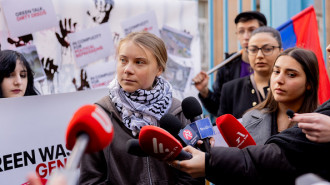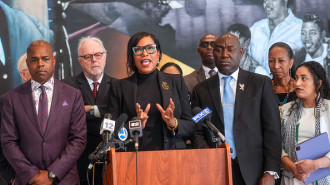Syrian anchor resigns after BBC's 'biased' Syria coverage
A leading Syrian journalist has resigned from her role as a BBC presenter, after the British public broadcaster came under fire for its "biased" coverage of the Syria war.
Dima Izzedin said that her decision to leave the media outlet was in part due to the BBC's coverage of her home country, which activists say has closely followed the Syrian regime's narrative.
"Today I was supposed to go back to the BBC screen after an absence of a year but I will no longer go back," she posted on Facebook.
Izzedin, who had been with the BBC for eight years, said she was thankful for her experiences there and the friends she had made, but ultimately its reputation as an impartial leading media outlet was in repute.
"The standards adopted by this great institution are supposed to make it first class in media, but this not the case," she wrote in Arabic.
"Unfortunately, these standards are no longer applied as it should be. Eventually I took from the BBC... today I leave it as it is no longer like me nor am I like it. The news on my wounded homeland departed us."
'Biased'
The news came after Syrian regime and Russian war planes mercilessly pounded rebel-held eastern Aleppo for a week.
The devastating air campaign and shelling led to two hospitals destroyed and 250 people dead.
The BBC reported that in one attack, Syrian rebel had bombarded a regime-controlled district of Aleppo and killed 44 civilians. The truth is that the dead were from an opposition-held district and the bombs fired from the regime.
The images showed the distinctive gear of emergency workers from the White Helmets sifting through rubble looking for survivors.
 |
Today was supposed to go back to the BBC screen after an absence of a year but I will no longer go back - Dima Izzedin, former BBC anchor |
 |
Although the civil team does not take sides in the conflict, the fact that the vast majority of shells and bombs are fired by the regime means they work almost exclusively in rebel areas.
Even the high death toll – supposedly of people in government-held areas – which the BBC reported was not given by Syrian state news or the Syrian Observatory for Human Rights.
It led Syrians to suspect an inherent bias from the broadcaster. Once the public broadcaster realised its mistake it made an apology, which activists said was half-hearted and would not repair the damage.
'Inside' reporting
Supporters of the Syrian revolution have said the London-based media outlet displays clear sympathy with the regime narrative. Language closely reflects Damascus' own propaganda, they added.
Damascus-based BBC Arabic Syria correspondent Assaf al-Aboud has also come under flack for reporting on the war while embedded with regime troops.
The fact that he reports from the security-tight government-held capital – where dissent leads to arrests and ultimately death – means he is also unable to report truthfully or impartially, they add.
BBC English presenters have also been accused of giving sympathetic portrayals of life under government control.
It is not just the Syrian opposition who have pointed this out.
Consultancy firm Media Tenor analysed more than 47,000 BBC news reports in 2015 and concluded that the state broadcaster's coverage of Syrian President Bashar al-Assad was more favourable than its portrayal of the European Union.
The BBC prides itself on being an impartial news provider. But in a war as politically charged and bloody as Syria they appear to have picked sides... activists say, it's the wrong one.







 Follow the Middle East's top stories in English at The New Arab on Google News
Follow the Middle East's top stories in English at The New Arab on Google News


